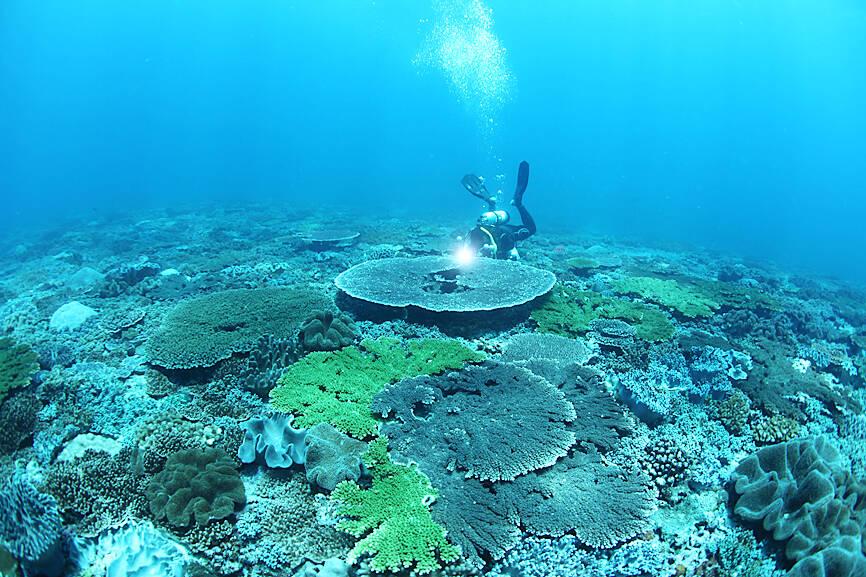The Legislative Yuan on Friday passed a conservation law aimed at improving the protection of marine ecosystems by designating areas to be protected and closing core zones to civilian maritime traffic.
Under the new marine conservation act, the Ocean Affairs Council (OAC) is authorized to form an advisory committee composed of academics, conservationists, fishers and indigenous Taiwanese, with the latter two groups making up at least one-third of its members.
The committee’s role would be to plan and review the designation of marine conservation areas, which would have core and buffer zones, with each subject to distinct rules and regulations.

Photo courtesy of the Taiwanese Coral Reef Society
For a conservation area to be established, two-thirds of the committee members would have to vote in favor, and a majority of members must be present at the time of voting.
Core zones would be closed to civilian maritime traffic, and those caught entering the area and refusing to leave could be fined NT$50,000 to NT$500,000, the bill stipulates.
However, people who mistakenly enter a core zone and leave after a warning would not be fined. However, if they return to the area within two years, the penalty would apply.
Meanwhile, military vessels carrying out operations or patrols related to national security or defense would be able to enter the core zone, as would ships involved in search and rescue, scientific research and other activities.
Activities including aquaculture, the harvesting of marine organisms and construction of marine projects in buffer zones could be allowed with government approval, but those caught without permission to carry out such activities would be fined NT$30,000 to NT$300,000, the bill stipulates.
Activities that are essential for indigenous cultures or rituals would not be subjected to the restrictions in buffer zones, it added.
The act stipulates that the overall policy guidelines for the management of marine conservation areas would be formulated by the council in consultation with other relevant agencies, and then submitted to the Executive Yuan for approval.
The designation of marine conservation areas and related restrictions would take into account the interests of fishers, indigenous Taiwanese and others, OAC Minister Kuan Bi-ling (管碧玲) said.

Beijing could eventually see a full amphibious invasion of Taiwan as the only "prudent" way to bring about unification, the US Department of Defense said in a newly released annual report to Congress. The Pentagon's "Annual Report to Congress: Military and Security Developments Involving the People's Republic of China 2025," was in many ways similar to last year’s report but reorganized the analysis of the options China has to take over Taiwan. Generally, according to the report, Chinese leaders view the People's Liberation Army's (PLA) capabilities for a Taiwan campaign as improving, but they remain uncertain about its readiness to successfully seize

Taiwan is getting a day off on Christmas for the first time in 25 years. The change comes after opposition parties passed a law earlier this year to add or restore five public holidays, including Constitution Day, which falls on today, Dec. 25. The day marks the 1947 adoption of the constitution of the Republic of China, as the government in Taipei is formally known. Back then the Chinese Nationalist Party (KMT) governed China from Nanjing. When the KMT, now an opposition party in Taiwan, passed the legislation on holidays, it said that they would help “commemorate the history of national development.” That

Trips for more than 100,000 international and domestic air travelers could be disrupted as China launches a military exercise around Taiwan today, Taiwan’s Civil Aviation Administration (CAA) said yesterday. The exercise could affect nearly 900 flights scheduled to enter the Taipei Flight Information Region (FIR) during the exercise window, it added. A notice issued by the Chinese Civil Aviation Administration showed there would be seven temporary zones around the Taiwan Strait which would be used for live-fire exercises, lasting from 8am to 6pm today. All aircraft are prohibited from entering during exercise, it says. Taipei FIR has 14 international air routes and

The Ministry of National Defense (MND) today released images of the military tracking China’s People's Liberation Army (PLA) movements during the latest round of Chinese drills around Taiwan. The PLA began "Justice Mission 2025" drills today, carrying out live-fire drills, simulated strikes on land and maritime targets, and exercises to blockade the nation's main ports. The exercises are to continue tomorrow, with the PLA announcing sea and air space restrictions for five zones around Taiwan for 10 hours starting from 8:30am. The ministry today released images showing a Chinese J-16 fighter jet tracked by a F-16V Block 20 jet and the